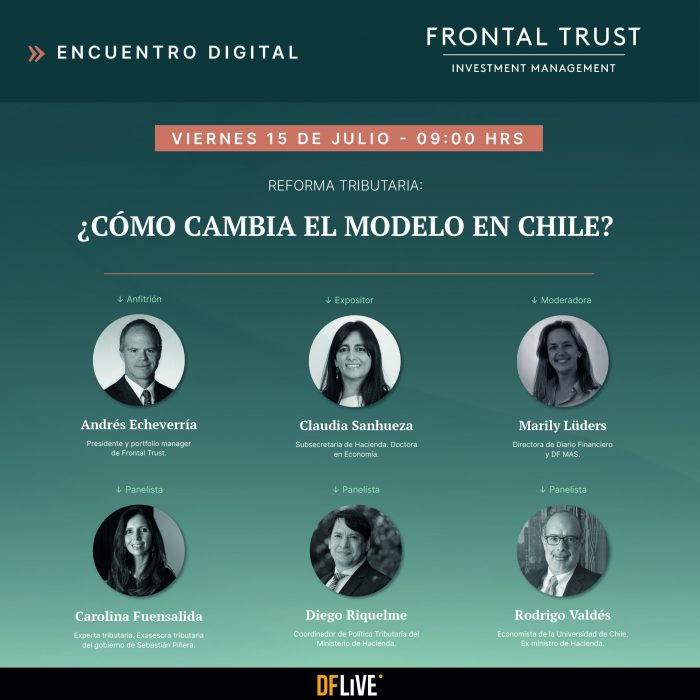Fontal Trust Tax Reform Webinar: How does the model change in Chile?

The event was attended by the undersecretary of the Ministry of Finance, Claudia Sanhueza, who explained the key points of the reform. Panelists Rodrigo Valdés, Carolina Fuensalida and Diego Riquelme then presented their vision of the proposal, with special emphasis on the impact of such reform on investments and the economy.
In the series of online events that Frontal Trust offers to its clients, investors, and the general public, in alliance with Diario Financiero, the Tax Reform webinar was held last Friday, July 15: How does the model change in Chile?, a conversation that had the participation of the undersecretary of the Ministry of Finance, Claudia Sanhueza, who presented the most relevant aspects of this project, which is being discussed today in the Congress, with special emphasis on the levies of the new program along with new changes about taxation to individuals, reduction of exemptions, tax avoidance and enforcement, mining royalty and corrective taxes.
The undersecretary assured that Chile maintains a gap in tax collection as compared to OECD countries, which, including private contributions, currently amounts to 8% of GDP.
She mentioned that to cope in a fiscally responsible manner with social and productive challenges more permanent income is necessary, and that, because of the regressive characteristics of our tax system, the biggest additional effort must come from high-income and wealthy people.
In this context, she said that Chile after tax reform will move closer to the OECD statistical mode, and was confident of having a fruitful dialog on the proposal in Congress.
After her presentation, a panel of experts composed of the former Finance Minister and director of Frontal Trust, Rodrigo Valdés; the coordinator of tax policy of the Ministry of Finance, Diego Riquelme; and the lawyer and former tax advisor of the government of Sebastian Piñera, Carolina Fuensalida, made a critical analysis of the project, addressing its impacts on investment, growth, and development in the country and on people. The conversation was moderated by Diario Financiero Director Marily Lüders.
Rodrigo Valdés highlighted the advantages of moving toward an unintegrated system, and among these, he mentioned simplicity as a fundamental value. However, he disagreed with some points in the proposal, for example the estate tax. “The wealth tax is itself complex, it introduces great fear, it gets a lot of political burdens… I worry about it, and I worry about its figures,” he said.
He added that it is a mistake to suggest that the richest and the biggest are going to pay for everything, and he stressed that “to build a welfare state, everyone has to put on, and this includes SMEs and also the lowest tax tranches.”
The economist said that it is necessary to make a tax pact and try to converge toward a model of stabilization of the system that guarantees us that we are not going to be making changes every four years.
The tax policy coordinator of the Ministry of Finance, Diego Riquelme, recognized that the adoption of an unintegrated system is “a major reform, which effectively changes the structure, and that is why we established a system of graduality.” He also said that the Ministry of Finance is open to making modifications to the proposed project. “What we wrote is not infallible. It can be corrected and improved”.
Carolina Fuensalida, meanwhile, was critical of the proposal, pointing out that “we return to principles that were debated in 2014… that generated much uncertainty, doubts, and that were considered by consensus in the Congress at the time not to be the best solution for the country.”
She added that the authors of the reform seem to be convinced that investment decisions and investors are static, and they are unable to move elsewhere in search of better conditions if they see the rules of the game changed and a battery of new taxes is introduced, and so the uncertainty increases. She also criticized the fact that the concepts of growth and investment were not present in the project.
Finally, she said that the bill presented by the Government does not meet the objective of simplicity outlined by the authorities, as it maintains differentiated tax systems for different groups.
This online event – which was broadcasted live through the Frontal Trust platforms and the website of Diario Finanicero – had high attendance and interest, exceeding 500 attendees and obliging the organizers to extend its duration due to the large number of questions submitted.
Si quieres descargar la presentación de la Subsecretaria de Hacienda, Claudia Sanhueza pincha acá.
